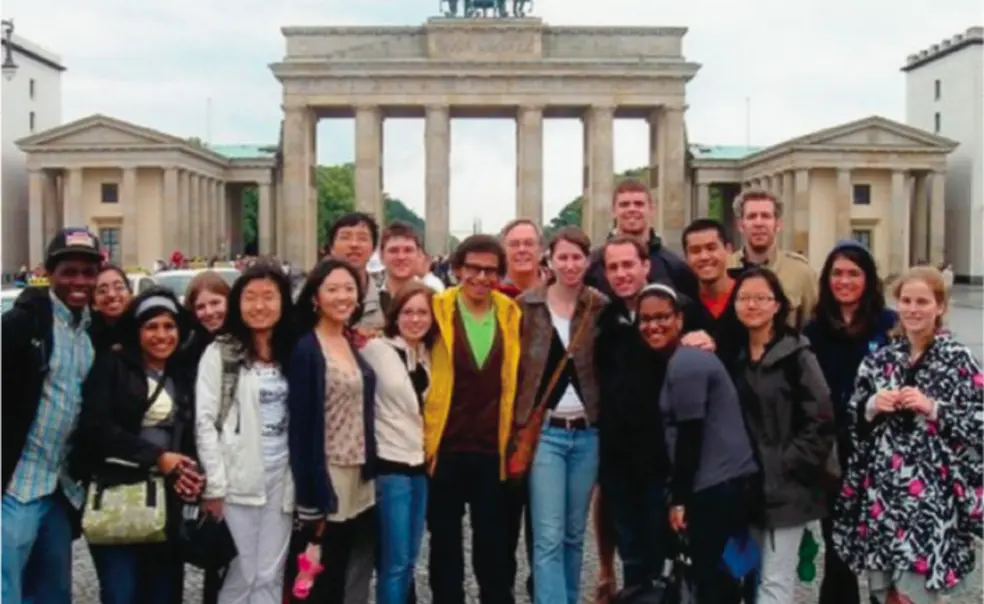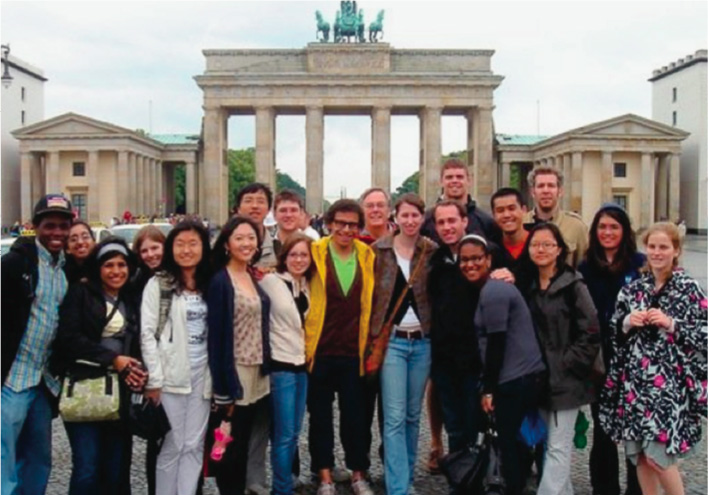Nowhere has the spirit of globalization taken stronger root than in our Department of German. Since its establishment in 1958, this small but dynamic department has embraced a cosmopolitan vision, personified by its first chair, Victor Lange, a renowned German-born scholar who headed the International Association of Germanists. He brought its congress to Princeton in 1970, as well as a landmark meeting of the postwar German literary society, Gruppe 47. But even Professor Lange would, I think, be impressed by the myriad ways in which our undergraduates, graduate students, and faculty are building transatlantic bridges, not simply to enhance the study of German on our campus but to truly internationalize it. Indeed, under the leadership of Class of 1900 Professor of Modern Languages Michael Jennings and his colleagues, the intellectual boundaries between Germany and Princeton have all but disappeared.
In an inspired move, the department has created three “permanent visiting” professorships, allowing it to weave a group of eminent German scholars into the very fabric of its work over a three-year period, including two in-residence semesters. The first group to join us—from the University of Konstanz, the Humboldt University of Berlin, and the Center for Literary and Cultural Research in Berlin—greatly enriched the conversations on our campus, from 19th- and 20thcentury literature to feminist and poststructuralist theory. But they also became what Professor Jennings aptly calls “permanent beachheads” for our graduate students in their home universities in Germany, creating a degree of institutional and intellectual continuity between studies at home and abroad that is the envy of our peers.
These talented graduate students are themselves the product of both American and German institutions, with roughly two-thirds coming to Princeton from within the United States and the other third hailing from Germany. This, too, allows for the kind of cross-pollination of ideas and methodologies that makes for world-class teaching and research, especially when these interactions are complemented by an array of formal collaborations between our department and German institutions. Among the most important collaboration is the PhD-Net, a partnership with the Humboldt University of Berlin, as well as Harvard University and the University of California- Berkeley, that explores the relationship between knowledge and literature through a multifaceted curriculum that is open to doctoral candidates from all four institutions. Each year, two of our graduate students travel to Berlin, while we, in turn, host two from Germany, laying the groundwork for the kind of transnational scholarship that will be critical to their professional success in later years. More immediately, as a result of this international exposure, our department has been remarkably successful in placing its graduates at the world’s premier universities. Other international ventures range from a research network centered on the novelist Franz Kafka to a new graduate-level summer school for media studies at the Bauhaus-University Weimar, taught jointly by our own and local faculty, that reflects our department’s growing strength in this comparatively young field.
A significant number of undergraduates—and virtually all concentrators—are also immersing themselves in the language, culture, and academic life of Germany, thanks to three distinct programs: Princeton-in-Munich, an intensive fourweek round of classes, precepts, and excursions conducted by our faculty and the staff of the Goethe Institute with the generous support of the Max Kade Foundation; the longrunning Summer Work Program, which offers our students paid and unpaid internships in German-speaking countries with the invaluable assistance of David Fisher ’69 and the Princeton Alumni Association of Germany; and a junior year or semester abroad at the Free University of Berlin through the Berlin Consortium for German Studies. These experiences, either singly or in combination, have left an indelible mark on our students. In the words of Chris Green ’12, who spent a summer working at the Städel Museum in Frankfurt, “It has put me on a clear course for the rest of my life.”
Engaging with the world of scholarship beyond our national borders requires a significant investment of resources, hard work on the part of faculty and staff, and an element of risk, but as the Department of German demonstrates, the connections that are formed, the excellence that is fostered, and the doors that are opened more than justify this effort.














No responses yet